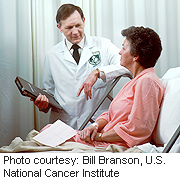- Major Women’s Health Study Supports Hormone Replacement Therapy in Early Menopause
- Organic Walnuts Tied to Serious E. Coli Illnesses
- More Than Half of Cats on Farm Where Bird Flu Infected Cows Died After Drinking Milk
- Biden Administration Could Reclassify Marijuana as Less Risky Drug
- Americans of Pacific Island Ethnicity Have Up to Triple the Rate of Cancer Deaths
- How Anger Could Raise Your Heart Risks
- EPA Clamps Down on Deadly Toxin Found in Paint Strippers
- Popular Teens (Especially Girls) May Get Less Sleep
- Years Prior to Menopause Are Danger Zone for Depression
- School Entry Rules Boost Kids’ HPV Vaccination Rates
Many With Heart Failure Aren’t Told About End-of-Life Care: Study


Health-care providers are often hesitant to discuss end-of-life care with their heart failure patients, new research reveals.
For the study, researchers surveyed 50 doctors and 45 nurse practitioners or physician assistants at the Mayo Clinic in Rochester, Minn., and the Mayo Clinic Health System. The investigators found that only 12 percent said they had routine yearly discussions with heart failure patients about end-of-life care, as recommended by the American Heart Association (AHA).
About 30 percent of the health-care providers said they had little confidence in their own abilities to discuss or provide end-of-life care, according to the study.
The findings, which should be viewed as preliminary until published in a peer-reviewed journal, were scheduled for presentation Wednesday at an AHA meeting in Baltimore.
The study authors found that 52 percent of the health-care providers were hesitant to mention end-of-life care to patients. Of those, 21 percent believed patients weren’t ready to talk about the topic, 11 percent felt uncomfortable bringing it up, 9 percent said they were concerned about destroying a patient’s sense of hope, and 8 percent said they didn’t have time.
Heart failure occurs when the heart doesn’t pump blood as well as it should. It is often the result of narrowed arteries or high blood pressure, which can leave the heart too weak to pump efficiently. About 5.1 million Americans have heart failure and about half die within five years of their diagnosis, according to the AHA.
Heart failure specialists and community cardiology clinicians were far more likely than primary care providers to have referred heart failure patients to “palliative care” within the past year — 89 percent versus 21 percent. Palliative care involves pain relief, treatment of symptoms, support services and counseling, with the goal of improving quality of life.
“Providers did express an interest in receiving additional training to develop the skills and confidence to talk about end-of-life care with their patients with heart failure,” study lead author Dr. Shannon Dunlay, a Mayo Clinic cardiologist, said in an AHA news release.
She noted that discussing end-of-life care may ease anxiety for some patients and families.
“Incorporating end-of-life conversations into the ongoing, routine care of the patient is important as goals and preferences can change over time, and patients and their families can feel more comfortable and confident in relaying their wishes to multiple providers,” Dunlay said.
More information
The U.S. National Heart, Lung, and Blood Institute has more about heart failure.
Source: HealthDay
Copyright © 2024 HealthDay. All rights reserved.









